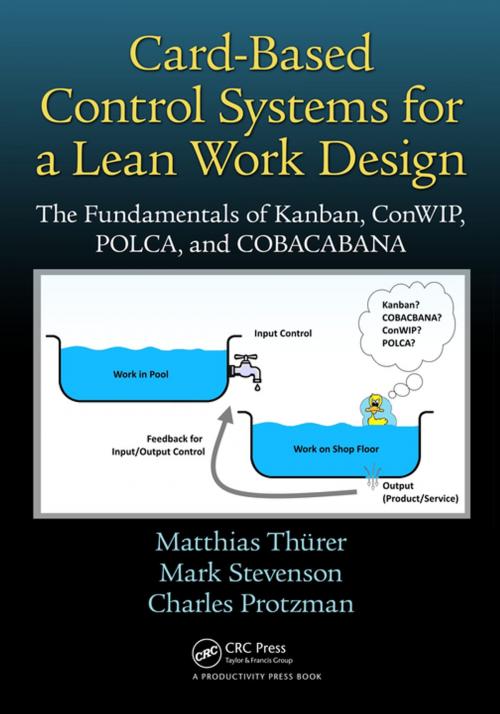Card-Based Control Systems for a Lean Work Design
The Fundamentals of Kanban, ConWIP, POLCA, and COBACABANA
Business & Finance, Industries & Professions, Quality Control, Business Reference, Nonfiction, Science & Nature, Technology| Author: | Matthias Thurer, Mark Stevenson, Charles Protzman | ISBN: | 9781498788342 |
| Publisher: | CRC Press | Publication: | April 5, 2016 |
| Imprint: | Productivity Press | Language: | English |
| Author: | Matthias Thurer, Mark Stevenson, Charles Protzman |
| ISBN: | 9781498788342 |
| Publisher: | CRC Press |
| Publication: | April 5, 2016 |
| Imprint: | Productivity Press |
| Language: | English |
Many shops have simplified their production control by using card-based systems such as kanban and Constant Work-in-Process (ConWIP). Although these systems provide a simple and highly effective visual approach for controlling manufacturing and service operations, all too many shops struggle with failed implementations or achieve results that fall below expectations. These outcomes can be attributed to a poor fit between the actual control problem and the solution applied.
This book takes a different approach to most other books on the subject—as it starts with an introduction to the control problem, instead of the control solution. Card-Based Control Systems for a Lean Work Design outlines how the problems encountered in typical manufacturing shops and service providers can be characterized, which allows for improved problem diagnosis.
The first four chapters of the book lay the foundations for problem diagnosis. The next three chapters then discuss, in sequence, each of the three "traditional" card-based control systems: kanban, ConWIP, and Paired-cell Overlapping Loops of Cards with Authorization (POLCA). The book explains how each of these card-based control systems works and identifies the specific type of control problem to which each system applies.
The next two chapters focus on Control of Balance by Card-Based Navigation (COBACABANA), a system developed for high-variety shops producing made-to-order, customized products. This is the first book to discuss this novel approach, which includes the use of cards to estimate due dates or delivery time allowances.
The book closes with a framework that provides guidance on which system to apply. This framework contrasts the control problem with the control solution. The potential of combining card-based systems is also discussed to create a nested solution.
Many shops have simplified their production control by using card-based systems such as kanban and Constant Work-in-Process (ConWIP). Although these systems provide a simple and highly effective visual approach for controlling manufacturing and service operations, all too many shops struggle with failed implementations or achieve results that fall below expectations. These outcomes can be attributed to a poor fit between the actual control problem and the solution applied.
This book takes a different approach to most other books on the subject—as it starts with an introduction to the control problem, instead of the control solution. Card-Based Control Systems for a Lean Work Design outlines how the problems encountered in typical manufacturing shops and service providers can be characterized, which allows for improved problem diagnosis.
The first four chapters of the book lay the foundations for problem diagnosis. The next three chapters then discuss, in sequence, each of the three "traditional" card-based control systems: kanban, ConWIP, and Paired-cell Overlapping Loops of Cards with Authorization (POLCA). The book explains how each of these card-based control systems works and identifies the specific type of control problem to which each system applies.
The next two chapters focus on Control of Balance by Card-Based Navigation (COBACABANA), a system developed for high-variety shops producing made-to-order, customized products. This is the first book to discuss this novel approach, which includes the use of cards to estimate due dates or delivery time allowances.
The book closes with a framework that provides guidance on which system to apply. This framework contrasts the control problem with the control solution. The potential of combining card-based systems is also discussed to create a nested solution.















